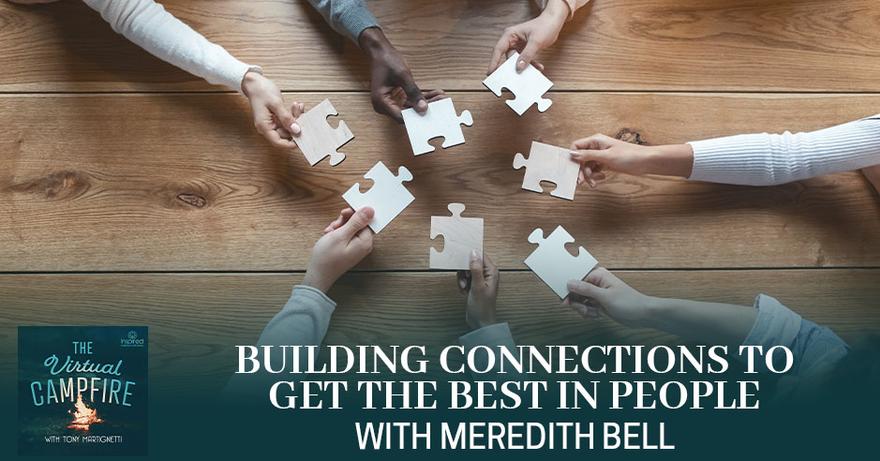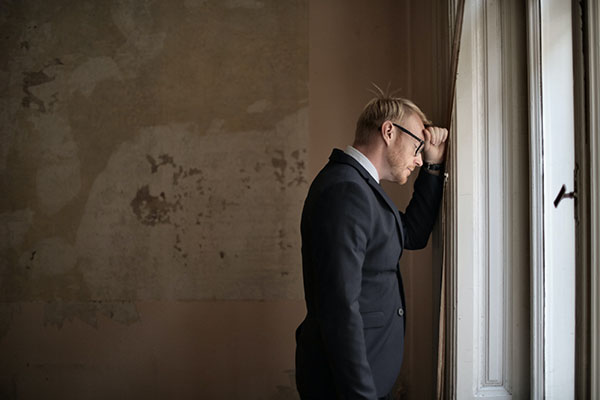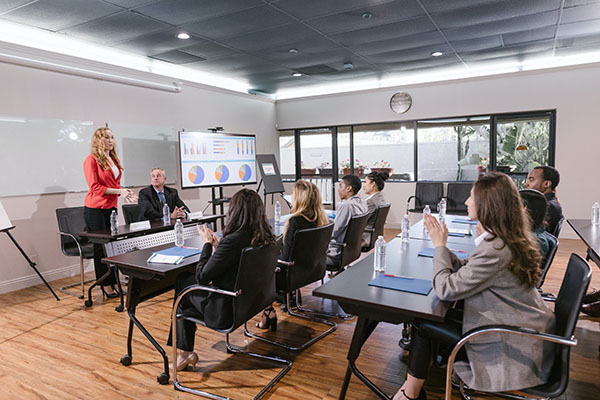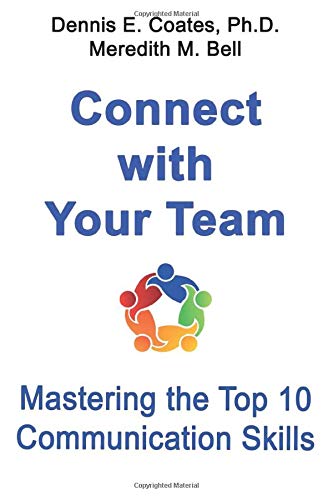Building Connections To Get The Best In People With Meredith Bell

Leadership is all about building connections. If you are the boss of a company and every time you connect with your employees, you bring up their mistakes, it’s not a healthy way to develop relationships in the workplace. As a leader, you need to focus on their good qualities. Your employees will learn how to appreciate themselves more because you brought up something positive over something negative. Tony Martignetti talks more about this with his guest Meredith Bell. Meredith is the co-founder and President of Performance Support Systems. She provides assessment and development tools for the workplace. Listen in on her story and how she pivoted from consulting to software programming. Learn how to properly connect with someone so that they can better themselves.
---
Listen to the podcast here:
Building Connections To Get The Best In People With Meredith Bell
It is my honor to introduce you to my guest. Meredith is a Cofounder and President of Performance Support Systems, a global software company providing assessment and development tools for the workplace. Their award-winning software and books guide leaders and teams to make the shift from knowing to doing the result in permanent improvements and the way people interact with each other at work. She is an expert and leader in team communications, the author of two books and the host of the Strong for Performance Podcast. She has worked with thousands of business leaders, human resource professionals, and learning and development executives to successfully implement their tools. Meredith coauthored her latest book, Connect with Your Team: Mastering the Top 10 Communication Skills with her business partner, Dr. Dennis Coates. Meredith and Denny provide an unprecedented step-by-step how-to guide for improving communication at work. Meredith lives in Williamsburg, Virginia area. She loves spending time with their grandchildren and getting out in nature, watching birds. I want to welcome you to the show, Meredith.
Thank you, Tony. I'm looking forward to our conversation.
Me too. From the time I've gotten to know you, I love your energy, your attitude and your way of approaching life. I'm looking forward to uncovering the story that brought you to where you are and making such an amazing impact in the world, which you truly are. We are going to uncover that story through what we call Flashpoints, points in your story that ignited your gifts into the world. Are you ready?
I am very ready. Thank you.
There might be one or many, as you are sharing your story, pause along the way and we will see what's showing up. With that, I want to turn it over to you and let you take it away.

I always, as a kid, visualize myself being a teacher. I enjoyed that. I played school and I would play the teacher. That's what I pursued through college. I didn't struggle with what do I want to do. The thing is after I became a teacher several years, and it didn't take that many, I discovered I didn't enjoy the repetition of the lesson plans. I was bored with the routine. I was always, as one example, changing around my kids' desks. They would come in and wonder, “Where's my desk?” I needed to switch things up. I decided to get my Master's and go into a more administrative central office work where I was supervising other teachers. I worked in three different school systems, and then I realized I don't do bureaucracy well and politics either. I was in that last position. I bet you, some of your readers will identify with this, I had two different bosses in two years.
The first year, the one that hired me was amazing. He appreciated my talents and gave me free rein and trusted me. I thrived and enjoyed working with him. In year two, a new superintendent was brought in who changed up everything. I’ve got a different person as a boss who was more of a micromanager. He didn't have the same level of trust in me and cold meeting us all the time. I’ve got put in charge of a program that I knew nothing about so it set me up for failure. I was stressed a lot and decided, “This isn't for me anymore.” The interesting thing was I had remarried and my new husband was wonderful.
He saw how uncomfortable I was and he said, “Whatever you want to do.” Tony, I had never had the first business course or read a business book. What I was passionate about is still what I am now, which is how people relate to each other, what gets in the way of us connecting with someone else. That was one of the things. I loved working with the teachers, helping them interact better with students and with other teachers. I decided I would do that for small businesses in my area. I started small because I didn't know anything about running a business but I knew I could learn it because one of my themes all through my life has been, “I am a learner, I will pursue, I'm passionate about reading and listening to podcasts.” This was way before the internet.
I read books, listened to, at the time, audiotapes and figured out what to do to introduce myself. What was fun, I was able to use a skill I had, which was speaking in front of groups as my main marketing tool. I started becoming a speaker to various local associations, and then I’ve got hired to come in and I helped people learn how to play nicely with each other, which evolved into leadership development and team building. That's what I did for several years and then I met Denny Coates, my coauthor of the book you mentioned. We started collaborating on some things, we decided we were compatible, we’ve got shared office space. That was an important flashpoint for me. I still remember not sleeping very well the night before. It was like deciding to move in with somebody before you decide you are going to get married.
We hadn't discussed merging our two companies at that point but we wanted to get out of our home offices and also share an administrator. That's what we did. It was good news because we’ve got along great, we had a lot of common ground and shared values, and we decided it made sense to put our two companies together and bring in a third partner who managed the finances and the operations. The three of us now, I am proud to say, have worked together for many years. I hardly ever talked to anybody that has had two business partners. The three of us are three equal owners in the business. We have had some flashpoints along the way. One of them is when Denny and I were doing these consulting projects and we wanted to use a tool called 360-degree feedback.
It was pretty new back then. This was in the early ‘90s. The ones that were out there were expensive and they weren't customizable. For those who might not be familiar, it’s an automated way to get input from people who work with a specific individual, about that person so that you get this report that helps them find out where are their strengths, where are the areas people are saying, “We would like you to improve in this.” We decided to create one ourselves and hired a software developer who did a great job. We beta tested it with our own clients and decided, “We are going to shift.” We didn't call it pivoting back then but pivot from being consultants to being a software company. Once again, we had zero experience in this area but figured, “We will figure it out as we go along.” That's what we have been doing now for many years. We have been a software company. The most recent flashpoint was in 2020 with COVID, we decided to put into books some of what we have been acquiring and doing over all these years.
Be open to possibilities. Be open to whatever may occur instead of fighting it.
I wrote my first solo book and published it in March of 2020, and then Denny and I published Connect with Your Team later that year. It has been exciting to get out there. We’ve got a fabulous quote from Ken Blanchard who said about the Connect with Your Team book, it's about the top ten communication skills that are needed at work. He said, “It’s because of your book, thousands of teams will communicate at a higher level.” I thought, “That's a challenge for us. How are we going to do that?” We set a goal to sell 1 million copies of our book. Denny has since written a companion book called Peer Coaching Made Simple, where people can work with partners to help work on and improve those communication skills. That has been exciting because we have had no idea exactly how to do that but we set it as our vision and we are making it happen bit by bit. It has been fun to watch that evolve.
It's funny you end on the word evolve because the word that has been circling in my brain since you have told your story is that your evolution has been amazing. You have evolved through this path that you didn't settle for what was, you kept on thinking what could be. To be in a software company, you probably never even dreamed of being a software company in this space and here you are several years in doing that. One of the things that I noticed from the early part of your story is that when you were talking about how breaking up the routines is an important part of how you saw things show up but you want it to not be stuck in those routines. Oftentimes, that's what good communication is about, not just coming in and accepting what is. It’s changing things up a little bit. Accepting that, "If I get out of my comfort zone and have a conversation with someone that I'm not used to or who I’m a little bit uncomfortable having a conversation with, new amazing insights can happen.”
One of the things that are evolving over the years is being open to possibilities and whatever may occur instead of fighting it and wishing it were different. This is what we have. This is the reality in front of us. How do we want to respond to it at this moment? Sometimes we waste a lot of energy, and I have in the past, fighting what the reality is, instead of getting in a calm state. One of the important lessons over the years is the more I get worked up into a state of worry, fretting or fear, that prevents my creative side from being able to show up because you can't have the two together. I say these affirmations every morning and some people call them, I am statements. One of them is, “I am absolute calmness, clarity and confidence.”
That has helped me in so many situations where I could have gotten uptight, “Technology failed me. What am I going to do? How am I going to make this work?” If I weren't staying calm at the moment, I wouldn't be able to think through what are my options. “What's possible here?” That has been an important learning for me, even more deeply the past few years that if I could have learned it earlier, it would have been nice. It would have saved me a lot of anxiety over things that I had no control over in terms of external situations. We always have a choice about how we are going to respond at a given moment. That can affect the outcomes we get.
I'm going to add another C when it comes to mind, which is if you are coming from a place of Calmness, that Calmness helps with how you connect. I have noticed that, whether or not somebody connects with me, I'm sure some things are out of my control but I have to start with how I show up, how I'm being. If I'm not open and if I'm not feeling calm and confident about myself, then I can't connect with them. It starts with having that awareness about how I'm showing up to a conversation that allows me to truly connect with another person as part of a team. I would love to hear your thoughts on that.

Connect to me is huge. An a-ha for me was reading a book. I'm not a professional coach. I love coaching and helping because over the years we have had many consultants and coaches who have used our products and I have informally coached them. I read this book, The Prosperous Coach, which many of your audience may be familiar with, by Steve Chandler and Rich Litvin. There was a sentence in there that leaped off the page to me out of the whole book. I use it every time I get ready for a conversation or an interview like this because it's fundamental to connecting to getting to your point. It's asking this question, “How can I serve this person so powerfully that they never forget our conversation for the rest of their life?”
When I bring that to a conversation with a new person I have met on LinkedIn. If I'm focused on how can I serve them, I'm listening for what are they looking for where might there be some gaps where I could offer some resources, be of help to them in some way. That relaxes me because I'm not feeling the pressure of inserting something about what we have to sell. It's just being fully present with this other person and also asking questions that might get them to think about things they haven't thought of before or to learn about them in a way that others may not have asked.
When you think about a conversation that someone never forgets, it's never about me. If I'm telling them a lot of things about me, that's forgettable for them because it doesn't touch their heart, mind or spirit. What is a way that we can connect in a profound manner that has an impact, not from an ego wanting to have an impact, “I want to be the great influencer?” No. It's putting that other person in the spotlight so they feel heard, valued, understood and appreciated. That's huge for connecting with others. When someone senses that about you and how you are coming across, it's amazing how quickly you can go deep with someone to meaningful conversations and not stay at a superficial level.
When you do that, there's an element of people feel that on a deeper level too and they mirror that back to you. They can say, “I'm seeing what they are trying to do or create for me. I want to create the same thing back for them by opening up about myself, cocreating this together. We are creating a conversation together that is at another level, not at the superficial level.” That's where the meaningful dialogue comes from, is starting with one person being courageous enough to say, “I'm ready to have this conversation where I'm serving you from a place of real deep service.”
I love that other C-word, courage because too often, people in relationships because of their own stories they have told themselves over the years and beliefs about another person may hesitate to be honest to speak their truth about a situation, something that's going on or maybe the other person said. That to me is a key reason we wrote this book and why I am so passionate about getting out there. I see so much unnecessary pain and suffering in the workplace and in homes where people simply don't know how to connect because there has been a former hurt from something that was said and you haven't ever gotten over that so you carry that into the next conversation that you have with the person. You haven't addressed that past pain and you are ready for who knows what because of what you are bringing into that particular conversation.
This whole idea of, “How can I let go of the things I have believed in the past about this person so that we can have a fresh start?” Whether that is your spouse, one of your kids or a coworker, it's so important. Another aspect of that, Tony, is appreciation. I learned something important from Dan Sullivan in a podcast he and Joe Polish had together called 10xTalk. This is another one of those profound flashpoints when somebody else may have heard this and went on about their day, it stopped me in my tracks and I started thinking differently about this word, appreciate. Dan was saying that we think about money appreciating or land appreciating going up in value but we don't always think about appreciation in that way about another person.
I am absolute, calm, clear, and confident.
What he started doing before he would have a conversation with someone, whether it was going to be good, bad or planning a conversation, he wanted to enter that conversation with the best mindset and attitude about them. What he did in preparation for that was thinking about and even writing down, “What are the things about this person that I appreciate the most?” That way, when they walk through the door, came on screen, he had that in his mind. It wasn't like he started listing to them, “Here are the things I appreciate about you.” He didn't do that. What he was doing was holding that appreciation front and center. As he spoke to the person, they sensed it. They could feel that from him. I get chills thinking about it because it's so profound, hardly anybody does this.
We get caught up with the things the person did wrong in the past or what they did to hurt us and we forget these wonderful qualities they have and the essence of who they are. If we can focus on that, what it does, it not only changes your attitude and beliefs about them, it changes their own beliefs about themselves. They appreciate who they are even more. That is such a gift to give someone else to help them think more highly of themselves than they may have before. Imagine someone who is leaving their conversation with you feeling better about themselves than when they started it.
Positive intent is coming to mind of having assumed positive intent. If that is broken, then it still gives them chance to repair that but at least your giving them a sense that you believe in them. It gives them some power to come from that place of positivity. There's something that comes to mind. You and I might have this in common, I’m a huge fan of Benjamin Zander and The Art of Possibility. I'm not sure if you have read that book before.
I have not.
It’s such an amazing book. One of the things he talks about in that book is this idea of giving yourself an A. Each student that came into his school would say, “I want to start by giving you all an A. It's your chance to earn it.” It's not about starting from a place of zero or a place where we have to build up to that A but you have an A. All you have to do is to come from that place of being an A. The momentum is already built in your favor. It's in that positive place already. Do you think of it that way?

Yes, because it does. This setting of the positive expectations for someone and saying, “I know you can do it,” as opposed to doubting, “I'm not sure if you can do this.” Our language counts for so much. We underestimate the power of our words sometimes and what people remember. Especially as kids, we think back to those moments, those flashpoints in our childhood when someone criticized, embarrassed or humiliated us. I had some experiences like that where you carry those. Why set people up to have to brush off all these things from the past that have lingered and caused them to have self-doubt instead of being willing to say a positive thing? Tony, that reminds me sometimes we withhold making positive comments to someone else. It's a mystery as to why we do that.
I have learned to pay more attention to what I am seeing around me that someone is doing or how they are being that I can make a positive comment about. I'm not talking about false flattery. Even when you check out at the grocery store, if the cashier has been efficient, say that. I do that all the time, “I appreciate how efficient you are.” They look at me sometimes surprised but they always smile. Even with our masks these days, they still smile with their eyes. It's that thing of how I can acknowledge another human being and recognize the contribution they have made to me at this moment. We overlook those too often. Some things go unsaid that could make a difference for someone.
Everything matters. Ultimately, those little moments, if you have been on the receiving end of one of those moments where someone says, “Have a good day,” or it's something positive in your day and he means it, it can change the momentum of your day. I know that you are an advocate for making sure that the changes that you educate people on, the things that you are teaching people that they stick. It's so important because there are a lot of learning and development things that people put out there but oftentimes they don't stick around because they are in-the-moment activities. How do you turn the tide around that for your work? When it comes down to it with software, how do you make connections come alive?
The tool that we created initially is a 360-degree feedback and survey tool. The second one that we created is called Strong for Performance. I will tell you the elements we built into that to help someone change their behavior over time. The problem with so many, even excellent training programs with the best speakers or facilitators is if there's no follow-up and reinforcement, then the person is going to revert to what they have always done, the way they have done it. No matter how excited they are, when they leave the training, there's an actual physical barrier that is in the way. That is the brain is hardwired. It's an efficient way for us to operate as we repeat certain behaviors or ways of doing things, we do them automatically. We specialize in interpersonal skills. Everybody has a way of listening, giving, receiving feedback or working through conflict. We already have these habits. We are not going into a training program as a blank slate. That way of being is wired there. We need to practice the new way multiple times to create that.
We have a three-step process called focus, action and reflection, where you focus on one skill and specific behavior. Like with listening, maybe you interrupt people so you are focusing on letting people finish their sentences because your habit is you want to move quickly and efficiently through conversation so you have finished the thought even if it's not the thought they were going to express so you can all move on. That’s step one, is the focus, and then apply it, look for opportunities to practice it. After you practice it, this is the third part that most people miss because we are also busy and in a hurry, is to take time to slow down and reflect. How did it go? We ask questions like, “What happened? How did you feel about it? Why did it happen that way? What were you thinking? What was the setting? What was the outcome? Does the other person seem happy about what you did or did you not get a good reaction?” When we go through that, it helps us to learn from that experience so next time we practice, we are doing it a little bit better each time. Focus, action, reflection.
The other piece is having someone to coach us. We can't all go out and get an executive coach, a company can't bring in an executive coach. That's why we wrote this other book, Peer Coaching Made Simple so people could work with a partner and learn the simple steps that are involved. When you care about somebody else's progress, what do you do to hold them accountable? What do you do to show support? We have that element. Another piece is feedback. We can't continue to improve. Let's think of pro sports like golf. They pay a coach to point out to them what they need to do differently, they practice and get feedback, “You are still doing this. You are still doing that.” That feedback is important for us to know, are we hitting our target? Are we hitting the mark of what we want to do? Where our courage comes in is asking people for that feedback. “I have been working hard to not interrupt. How am I doing? Have you noticed any difference?”
An unforgettable conversation with someone is never about you.
People are all busy with their own lives. They are not focused on, whether you are changing unless you keep it at the forefront of their minds by asking. You can find out if you are making good progress or if there are still things they would appreciate you are doing. Those are elements that we describe in our book but also built into the software program to help people, over time, make those lasting changes. People can listen to this and become aware, “I could use an accountability partner. I need to remember to ask people for feedback so that I know if I'm improving or not.”
I'm so glad I asked this question because this is exactly the thing that will help the audience start thinking about, first of all, how to change those behaviors that they are having, especially in the workplace but also outside of the workplace that is getting in their way of, “How can I get out of that pattern? That's not serving me.”
Here's a question everybody can ask. I won't say it's easy, you have to be willing to hear whatever somebody else's truth is. For someone who's in a leadership role, to ask the members of his or her team, “What's one thing I could change that would make your experience working with me be even better?” It's only asking for one thing. First of all, it will shock people if you have never asked for their input before. To honestly say, “I want to be a better leader for you and help you thrive here. What is one thing I could do differently?” Ask that at home, “How could I be a better spouse? How could I be a better parent to you?” Your kids will be sure to tell you, they are not going to hold back. Your spouse, depending on how you have responded to feedback in the past, may be hesitant to share but I guarantee you if you start asking that.
You commit to working on that one thing, assuming you agree that that's something important and is something you are willing to do, you commit and then check in with them regularly, “How am I doing? I have been intentional with my efforts to consciously make this change. I want to see how I am doing.” You communicate so much when you ask and take action because you are communicating to that person, “Our relationship is important to me. I want to make it work. I want to do my part.” They may even, in turn, come back to you and say, “What's one thing I could do?” Whereas before, if you were to point out and suggest they do something different without them asking you, they may get defensive and start justifying and explaining.
That's the other piece. When you ask somebody what's one thing I could do and they tell you, don't jump into justifying why you have done it the way you have been doing it. Don't explain and defend. Simply say, “Thank you.” You might even say, “I did not realize. That was a blind spot for me. I'm so glad you told me.” If you express appreciation to the person, you are inviting them to be honest with you in the future. You are building that connection that is deeper because of your willingness to not let your ego get in the way but instead, a spirit of caring back to the person thanking them and appreciating their honesty because that's huge going forward building deeply meaningful relationships that last.

I love the way that you put this because there's something about this that opens up so many great relationships and it takes relationships further but it's also starting to the way you frame it. It’s about even better as a big important part of this question, it’s not about saying, “I'm bad.” You are not paying yourself as being someone flawed necessarily or bad in any way. It's about you saying, “I'm doing okay. Things are off the rails but it can always be better. I'm always open to changing and to be able to take the relationship to the next level.” The important part of this is also the context. You wouldn't ask this of anybody. It would have to be somebody who you trust, is going to give you feedback that is honest and helpful. Not all feedback you receive is well-intended and well received. One of the things that have been tricky about feedback is that not all of it is constructive.
It goes back to why we wrote this book. In our school systems, we don't teach people how to communicate well with each other. In homes, parents are doing the best they can but they haven't learned these skills either so we grow up not knowing. What's the appropriate way to give feedback to someone that would be received as supportive and encouraging to them even when it's needing to point out something where they made a mistake? If the other person trusts you that you have their best interest at heart, they are more likely to receive it positively. Honestly, we can't know what they grew up with, what they are bringing in in terms of experience. If they grew up hearing a parent that was constantly criticizing and demeaning them, then when you offer something, even if you try to couch it in a way that is from your perspective, support it, you aren't responsible for how they receive it.
What you are responsible for though is noticing. Do they seem to be having a bad reaction? Do you see their body sinking, and then to ask, “That didn't seem to land very well with you? What's going on? What are you thinking? Can you share your thoughts with me?” Whatever way you can say it to make the other person feel safe, to be honest with you, “You sounded like my dad right then. I used to hear that all the time.” Let's take time to tune into where somebody is coming from. Not to let them off the hook but to understand to empathize. Empathy is a key aspect of being an effective human being. If we can't understand where another person is coming from or we are not interested in understanding what it's like to be in their shoes, it's going to be hard to form that solid connection with them.
What is it that you have learned about yourself in this journey to becoming the person you are now? We have shared a lot of the journey coming from the teacher to the entrepreneur to now you are in software, the author and all these things that have happened along the way. I would love to find out from your perspective, what is it that you have learned, the lessons that resonate with you most?
I will focus on the ones that all of your audience will identify with. One is to have more compassion for myself because I would criticize myself. I have learned to pay attention to my words, internal dialogue, as well as what I say out loud. It's so important to be supportive of ourselves and how we view, think and talk to ourselves. My internal dialogue has evolved over the years. If I find myself getting into that internal critique of, “Why didn't you do it that way? This is what happened.” To adopt a more neutral stance about circumstances or even mistakes that I make.
They are all learning opportunities. I see them differently now. I love the image of having a lab coat on and being a scientist and saying, “Here's my hypothesis. Here's the experiment I ran. I've got data.” A scientist doesn't get all upset if the data doesn't match what they expected it to be. This could be some marketing campaign that we do or any action we take that doesn't have the outcome we thought. Instead of getting down on myself and this internal critique that only caused you to spiral downward instead, I go, “Here's the data. That didn't work.”
Don't let your ego get in the way of building connections.
Also, to take things a little more lightly, to be more playful. I have always been this serious person. It's, “What are you laughing about? It's serious business here.” To lighten up, it frees up that creative thinking. My way of being is more relaxed. Even though I'm intense about projects we are working on, I would look for reasons to laugh and make a game out of it so it feels more playful. It's that whole thing of enjoying every moment and not feeling tensed, pressured or anything negative because I have found whenever I get into a negative place, it doesn't serve me and the people around me well and it doesn't help to get the results that I'm looking for.
We are so grateful that you have taken this journey that you have been on because as much as there have been some ups and downs, ultimately, these realizations are what we need to hear and appreciate that you have learned these things that can be powerful insights for others. That's something that I'm grateful that we have had you on the show to share. Thank you.
Thank you, Tony. I loved our conversation.
 This has been amazing. We have one more question for you though. That last question is what is 1 or 2 books that you have been impacted by and why?
This has been amazing. We have one more question for you though. That last question is what is 1 or 2 books that you have been impacted by and why?
One of my all-time favorites, I have read it more than any other book because it's only 36 pages, it's called You2 by Price Pritchett. It's not a new book but it is so profound in terms of what's involved in making a quantum leap either in your life and your business. How do you up-level? One of the biggest things that book for me has been to quit focusing on the, “How am I going to do it,” because that's what I have looked for so often. “Give me the procedure. What's the 1st, 2nd, 3rd step?” Instead, look at what. “What is it I want,” and focus on where it is I want to go. That is a profound little book. Another one that's not as well known that I have referred to so often is called Straight-Line Leadership by Dusan Djukich. He contrasts two ways of being in each of his very short paragraphs, trying versus committing. It's simple, yet profound and powerful. If I could mention one more, Loving What Is by Byron Katie. She's the one that has helped so much with my thinking about not fighting reality and whatever the situation is, embracing it, enjoying it and challenging my thoughts about a specific situation so that I look at, whether it's true or not because our thoughts can get us into trouble.
Straight-Line Leadership, I have read that book a while back. It's fantastic. I'm glad you brought that up. All the books are great recommendations. I have picked up you2 after you had talked about it at one point. Thank you for that. I haven't read it yet but I will. Thank you so much for everything. This has been an amazing conversation. I'm so thankful that our stars have crossed and that we get the chance to share it with the audience.
Thank you, Tony. I'm so glad I was able to be with you.
I want to make sure that I can share your contact information. Where can people find you in the world?
Our website is a good place to go. It's GrowStrongLeaders.com. We have a video there that talks about our books and we have links to our products and also to my podcast. I have a Schedule a call with Meredith Bell button there, prominently so it's easy to find me. I'm also on LinkedIn, Facebook and Twitter on social media.
Thank you again. Thank you to our audience for coming on the journey. This has been pure magic.
Important Links:
- Performance Support Systems
- Strong for Performance Podcast
- Connect with Your Team: Mastering the Top 10 Communication Skills
- Book – Strong for Performance
- Peer Coaching Made Simple
- The Prosperous Coach
- The Art of Possibility
- Strong for Performance
- You2
- Straight-Line Leadership
- Loving What Is
- LinkedIn – Meredith Bell
- Facebook – Meredith Bell
- Twitter – Meredith Bell
- Schedule a call with Meredith Bell
- 10xTalk
About Meredith Bell
 Meredith Bell has been an entrepreneur since 1982. In her first business as a consultant and trainer, she conducted hundreds of programs for leaders and the members of their teams to help them communicate and work together more effectively.
Meredith Bell has been an entrepreneur since 1982. In her first business as a consultant and trainer, she conducted hundreds of programs for leaders and the members of their teams to help them communicate and work together more effectively.
As President of Performance Support Systems since 1991, Meredith is head of marketing and sales, and she’s personally worked with thousands of entrepreneurs, leaders, consultants and coaches. She loves building strong relationships with our clients, resellers, affiliates and vendors. She understands what’s required to build the loyalty and commitment that lead to repeat business and referrals. Meredith is always looking for great joint-venture and affiliate relationships, so contact her if you have an idea for one!
Meredith is also a major contributor to the learning materials in all the company’s products, especially Strong for Performance. This unique virtual coaching system combines assessment, learning resources and a self-selected coaching network to help people ingrain skills and new behavior patterns.
Meredith is the host of the popular Strong for Performance Podcast and is also a frequent guest on podcasts, where she addresses topics like essential communication skills for the workplace, the benefits of focusing on giving and being of service, and what’s required to develop positive habits and skills over time.
In her free time, Meredith enjoys spending time with her husband out in nature, exploring the world of birds. She also loves being a grandmother and cherishes time her two young grandchildren, who live close by.
Love the show? Subscribe, rate, review, and share! https://www.inspiredpurposecoach.com/virtualcampfire


0 comments
Leave a comment
Please log in or register to post a comment